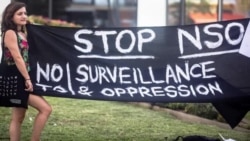On February 7, Naftali Bennett, Israel’s prime minister, vowed to investigate recent reports that Israeli police used Pegasus, the flagship spyware of the Israeli-based NSO Group, to intercept phones of Israeli citizens without legal authorization.
Bennett promised to investigate allegations of abuse and answer the public’s questions:
“The things that have been published, if true, are very serious. This tool [Pegasus spyware] and similar tools are very important tools in the fight against terrorism and in the fight against serious crime, but they are not intended for widespread ‘phishing’ among Israeli citizens or public figures in the country.”
That is misleading.
On its website, the NSO Group says it “develops best-in-class technology to help government agencies to detect and prevent terrorism and crime.” Its premier product, known as Pegasus, reportedly can break into encrypted mobile phones and access texts, emails, photos, location data and even take over the camera and microphone to eavesdrop on targets without detection.
Pegasus reportedly has helped governments fight criminals and thwart terror plots, but it has been making headlines for cracking into the phones of activists, journalists and political targets worldwide.
In July 2021, Amnesty International and Paris-based Forbidden Stories led the Pegasus Project investigation, in which a consortium of 17 media organizations and 80 journalists participated. The consortium reported on a leak of 50,000 phone numbers chosen for surveillance by NSO customers.
The list of potential targets included 189 journalists in 20 countries and 600 government officials and politicians, including family members of assassinated Saudi journalist Jamal Khashoggi and the French President Emmanuel Macron and other heads of state. NSO’s clients included the governments of India, Mexico, Kazakhstan, Hungary, Saudi Arabia and the United Arab Emirates (UAE), the project reported.
In November 2021, the U.S. Commerce Department blacklisted NSO Group and another Israeli firm, Candiru, for developing and supplying spyware used maliciously by authoritarian governments to target activists, dissidents, journalists and others for repressive aims.
NSO has said its products are not operating against Israeli and U.S. phone numbers. But a new investigation found otherwise, at least as far as Israel is concerned.
On January 18, Calcalist, an Israeli business news outlet, said the Israeli police used Pegasus spyware without a warrant to hack into former politicians’ phones. Targets included mayors, critics of former prime minister Benjamin Netanyahu and ex-government employees.
According to Calcalist, an Israeli special operations cyber unit using signal intelligence (SIGINT) has been collecting the data using NSO’s spyware to search for information in the phones of citizens who weren’t criminal suspects, and it did so without a judge’s supervision.
In some cases, Calcalist said, phones were infiltrated to spare the police from doing regular investigations to identify suspects, violating the privacy of citizens. Some targets had not participated in illegal activity and never intended to do so.
Initially, Israel’s police agency denied Calcalist’s report, releasing a statement that said:
“The claims included in your request are untrue. Israel Police acts according to the authority granted to it by law and when necessary according to court orders and within the rules and regulations set by the responsible bodies.”
Israeli authorities, however, have ordered multiple investigations into the spying allegations, including one by the Israeli attorney general’s office. Police Commissioner Yaakov Shabtai said he ordered “a thorough internal investigation.”
Haaretz newspaper said it obtained a copy of an invoice showing that Israeli police bought the software from NSO for 2.7 million shekels ($838,627) in December 2013. Since then, the police has purchased updates from NSO, Haaretz reported.
After the initial denials, the Israeli police said it found “anomalies” in its surveillance operations. Police officials told a parliamentary oversight committee that a second investigation turned up “additional evidence that changes certain aspects of the state of affairs.”
Britain’s Guardian newspaper reported the Israeli police didn’t mention NSO in its statement, which raised the questions about surveillance products developed by various Israeli firms.
NSO’s sales must be approved by the Israeli government, Reuters reported. The attorney general’s office is expected to have the results of its investigation by July 1.
Calcalist published another report on February 7, detailing the list of targets in Israel. They include disability rights group leaders, Israelis of Ethiopian descent, witnesses in Netanyahu’s ongoing corruption trial, businessmen and three former cabinet ministers.
The new findings could derail Netanyahu’s trial on corruption and fraud charges. The spyware was allegedly planted in the phone of a key witness in the trial who was supposed to testify soon. Netanyahu’s lawyers have demanded answers on what information was collected and how it was collected. It remains unknown if the allegedly gathered evidence was used against Netanyahu, the Associated Press reported.
On February 2, the FBI confirmed it had purchased NSO’s Pegasus to “stay abreast of emerging technologies and tradecraft,” the agency said a statement to the Guardian. The FBI added its aim was to evaluate and test the software and that it had not been used in any investigations.
The New York Times said in a January 28 report that the FBI purchased Pegasus in 2019 during the administration of former President Donald Trump, and the agency considered using another NSO product called Phantom that enables cracking into U.S. numbers.
In another separate report, The New York Times Magazine examined how Israel’s approval for sales of NSO products became intertwined with its diplomacy. The newspaper said Mexico and Panama supported Israel’s position at the United Nations following Pegasus sales, and that Pegasus sales played a hidden role in rallying support of Arab states against Iran.
“Through a series of new deals, Pegasus was helping to knit together a rising generation of right-wing leaders worldwide,” the Times story said.







